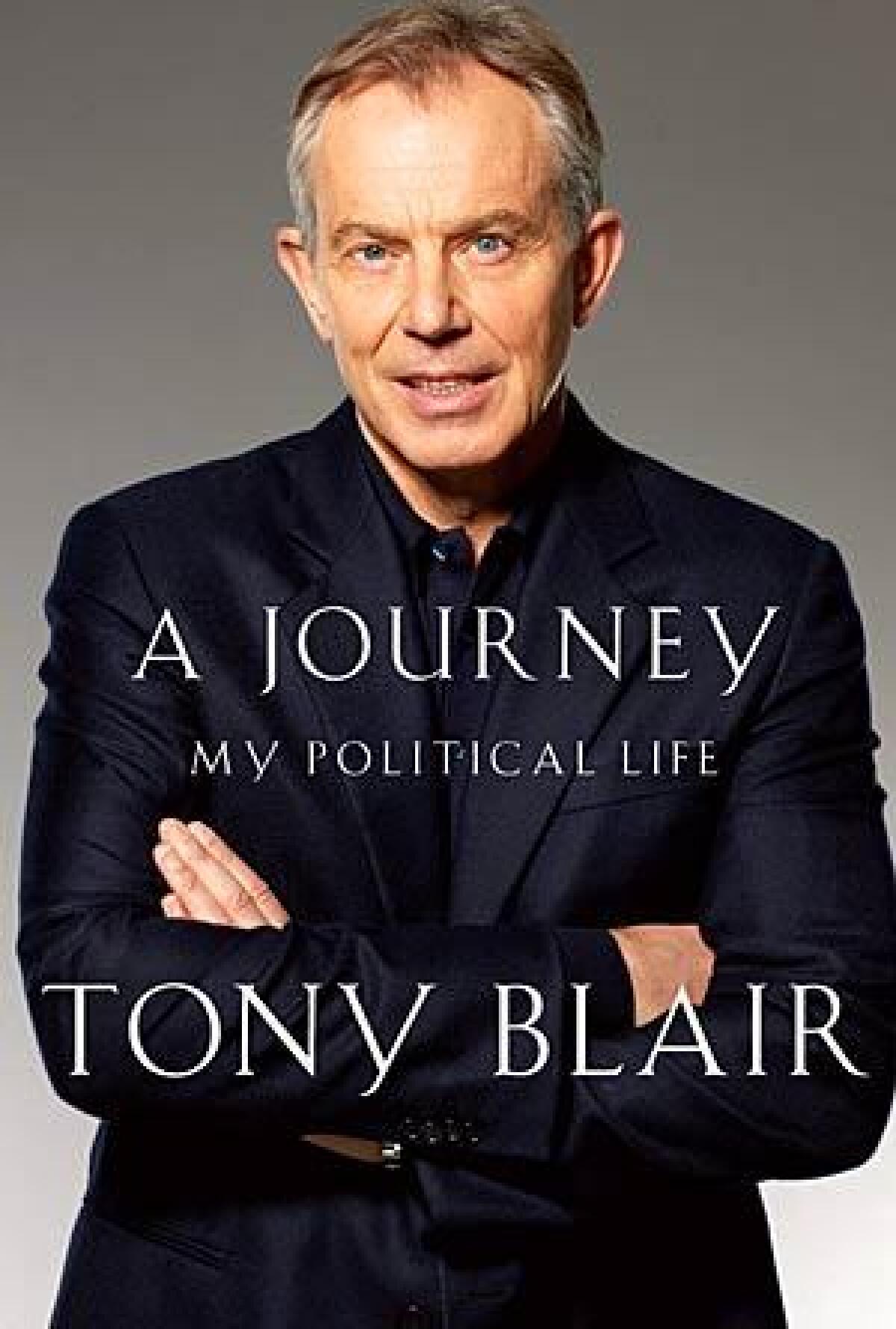Book Review: ‘A Journey: My Political Life’

Former British prime minister Tony Blair’s memoir “A Journey: My Political Life” is a political biography of unusual interest.
As a book, it’s unusual because he wrote it himself, which makes this volume unique among the English-speaking world’s recent political autobiographies. It also gives “A Journey” a disarming frankness that a professional collaborator almost certainly would have manicured away, along with anecdotes that are unintentionally self-revealing. There are also the extraordinary circumstances surrounding its publication. Blair reportedly received an estimated $7.5-million advance for his memoirs, but advance interest appeared slight. Then came the announcement that he will donate all proceeds to a charity for wounded British military veterans. Amazon UK now says “A Journey” appears set to become its bestselling political memoir ever.
Clearly this guy did not successfully fight three British general elections without a flair for getting attention.
The book’s nearly simultaneous launch in Britain and the United States this week also signals Blair’s desire to be regarded as a transatlantic figure. Blair expresses not only his deep regard for Presidents Bill Clinton, George W. Bush and Barack Obama, but also the fact that, during his 10 years in office, he “came to love America.” His memoir, he writes, “is a story about America, as well as, evidently a history of my time as British PM.”
Given the donation of this memoir’s royalties to Britain’s Iraq war casualties, a great deal of attention is likely to focus on Blair’s second thoughts concerning those conflicts. To put it concisely, he doesn’t have any. “I have often reflected as to whether I was wrong,” he writes. “I ask you to reflect as to whether I may have been right.” He continues to argue, convincingly in this reader’s mind, that the Afghan action was a war of necessity to uproot the perpetrator of 9/11 — Al Qaeda — and its Taliban sponsor, though he does admit he underestimated the depth of Afghanistan’s failure as a nation. In the case of Iraq, he argues that after 9/11 it simply was irresponsible to take the chance that any government sharing any part of the terrorists’ views or goals wouldn’t obtain weapons of mass destruction, and that the intelligence agencies reported Saddam Hussein was about to do that. That was wrong, he admits, but insists there was no way to know that at the time.
As Blair puts it, paraphrasing a U.N. weapons inspector, Hussein “thought the U.S. and its allies were bluffing when we threatened force and actually we were sincere; and we thought he genuinely had weapons of mass destruction when actually he was bluffing.” A great deal of death and destruction followed from that mutual miscalculation.
One of the things that emerges from Blair’s account of that period is his genuine affection and regard for Bush, whose calm, focus, lack of pretense and security in his own skin the prime minister found particularly impressive. He praises him, as well, for “integrity” and “political courage.” Dick Cheney, who “was unremittingly hard line,” struck him otherwise. “[I]t’s virtually impossible to have a rational discussion about him,” Blair writes. “To those on the left, he is, of course, an uncomplicated figure of loathing. Even for the middle ground, they tend to reach for the garlic and crucifixes. You have to go pretty far to the right to find Dick’s natural constituency.”
After 9/11, according to Blair, the vice president felt that the United States needed to prosecute the war “with terrorists and rogue states that supported them” in a total fashion. “He would have worked through the whole lot, Iraq, Syria, Iran, dealing with all their surrogates in the course of it — Hezbollah, Hamas, etc. In other words, he thought the world had to be made anew.... Of course, the attitude terrified and repelled people. But it will be obvious from what I have written that I did not think it was as fantastical as conventional wisdom opined.”
British readers may be interested to see just how much Blair’s conduct during that period — his resolve to stand “shoulder to shoulder” with the United States — was influenced by his belief that contemporary Britain’s standing in the world was inextricably linked to its special relationship with Washington. “All I know was that I did what I thought was right,” he says. “I stood by America when it needed standing by. Together we rid the world of a tyrant.”
Throughout this memoir, Blair adeptly uses Britain’s royals as a rhetorical foil, and the anecdotes involving them doubtless will be crowd-pleasers among American readers. Queen Elizabeth is rather “shy,” though on their first meeting she managed to put Blair firmly in his place by noting that he was her “10th prime minister” and that her first had been “Winston, but that was before you were born.” Prince Charles comes across a vague and distracted nebbish, “a curious mixture of the traditional and the radical” who at one point became alarmed over his belief that a deputy prime minister’s posture while drinking tea reflected class antagonism. Princess Diana, by contrast, was — in Blair’s view — “the essence of an era,” a “radical combination of royalty and normality” and the embodiment of all that New Labor wished to convey about itself. There is a detailed discussion of his relationship with Diana — more extensive than many Americans probably realized — and a recitation of the now fairly familiar events surrounding his intervention in the Windsors’ response to Diana’s tragic death.
“A Journey” is first and foremost a political biography, and long stretches of it are likely to be terra incognita to most American readers. Still, Blair — like Clinton — is one of the great politicians of this generation and that makes his candid moments particularly interesting. It’s hard to imagine any U.S. office-holder, for example, saying this about older voters: “One of the greatest myths of human existence is that as people get older, they get more benign, more long-suffering, more relaxed and more phlegmatic in how the world treats them. Not in my experience. The average Rottweiler on speed can be a lot more amiable than a pensioner wronged, or, to put it more accurately, believing they are wronged.”
Similarly, he is contemptuous of the media, government inquiries into failed policies and attempts to open official records to the public. Thus this comparison of Britain’s adoption of such an open records measure to the attempt to ban fox hunting:
“Fox hunting; now there’s a tale. One of the strangest parts of politics is how you get into situations of unbelievable controversy without ever meaning to or wanting to. The fox-hunting subject resulted in one of the domestic legislative measures I most regret, along with [Britain’s] Freedom of Information Act.… [B]oth were the cause of inordinate political convulsion, and for what purpose, God only knows.”
The ban on fox hunting — “the unspeakable in pursuit of the uneatable,” as Oscar Wilde called it — was a disaster, Blair explains, because he knew nothing of either the sport or its critics. “And here is a real political lesson,” he writes. “You have to ‘feel it’ to succeed in politics. That’s where instinct comes from, the emotional intelligence. By and large I do feel it, and so, on most issues, I get it. On this one, I had a complete lapse. I didn’t ‘feel it’ either way.”
Feelings, authenticity and emotional intelligence are qualities that rank high in Blair’s political lexicon. People, he writes, “know that the prime minister doesn’t really tootle off to the supermarket like they do. They don’t want to know that he actually does live like one of them, but they want to know that he could; and more, important, they want to know he feels like them, that they could get on.… It’s about temperament, character and attitude. It’s also about being authentic…I always used to say to people about George Bush: don’t underestimate his appeal as a normal guy. You might not agree with him, but if you’re a voter, you would never think you would be uncomfortable or feel inadequate if you met him socially; you would think he would be nice and easy with you. And you’d be right.... Clinton’s great political strength was an endless capacity to be fascinated even by the most unfascinating people because he was always willing to learn from them.”
He similarly admires the former Irish prime minister Bertie Ahern — “a true friend” — for his ability to do a deal: “He had that elemental quality that defines great politicians: he was student of history, not its prisoner.” Similarly, during the negotiations leading up to the Good Friday Agreement in Northern Ireland, he came to respect the Sinn Fein leaders Gerry Adams and Martin McGuinness: “When you saw the Republicans, you saw unity in motion. They had a line; they took it; they held it. It appeared to modify in the course of a meeting, it was illusion — the modifications had been pre-built into the line, and the line was sustained.”
Interesting sentiments for a Democratic leader and they do much to explain many of the difficulties Blair had with Labor Party colleagues who became increasingly fractious during his last years in office. They’re also a kind of unconscious lament, for Blair came to 10 Downing Street hoping to be one of the great postwar reforming prime ministers, like Clement Attlee or Margaret Thatcher, whom he rather admires. Instead the New Labor reforms, which he says in this memoir grew entirely out of his “middle class view of public services,” recede unmourned.
timothy.rutten@latimes.com
More to Read
The biggest entertainment stories
Get our big stories about Hollywood, film, television, music, arts, culture and more right in your inbox as soon as they publish.
You may occasionally receive promotional content from the Los Angeles Times.






